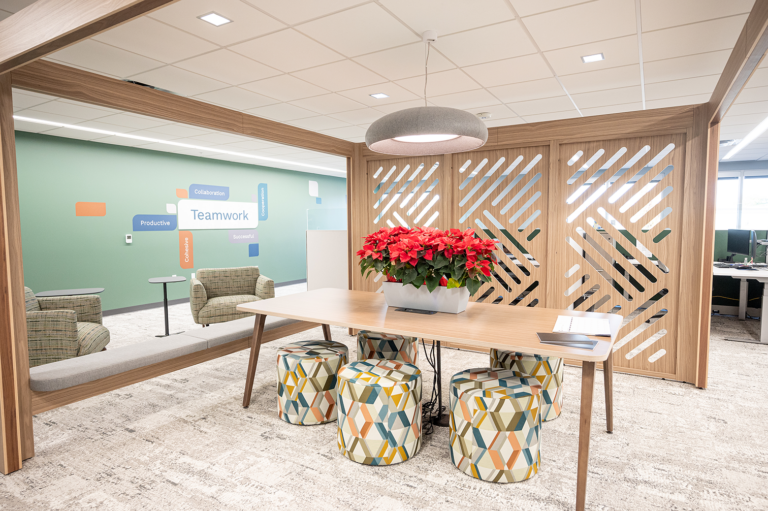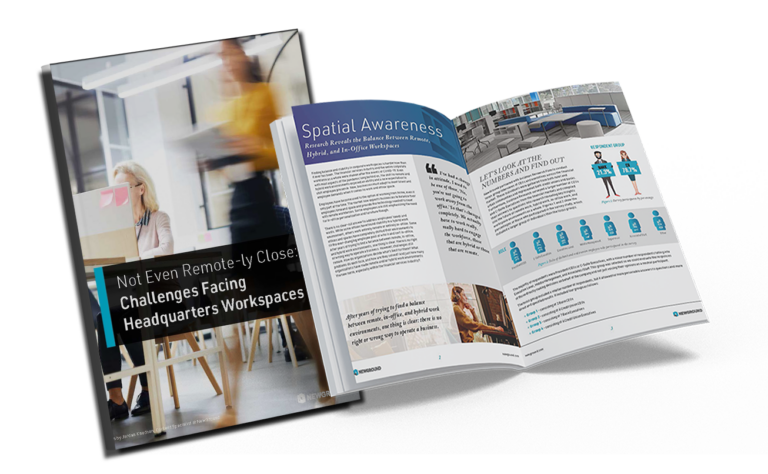As new technologies continue to reshape the way we work, many banks and financial institutions are turning to hybrid work environments to balance the benefits of remote work with the need for in-person collaboration. But adapting to this new way of working requires careful consideration of the needs of employees, clients, and physical space. At NewGround, we are committed to helping financial institutions navigate these challenges and create successful hybrid work environments.

The Demand for Remote Work
According to a recent PwC survey, nearly half of financial services executives believe remote work is here to stay and their firms will be more flexible in the future. In fact, many professionals have gotten used to remote or hybrid work arrangements and are unlikely to return to full-time in-person work.
While remote work can offer many benefits, such as increased flexibility and reduced commuting time, it also presents challenges for financial institutions. Managers must find new ways to monitor and motivate their teams while maintaining the quality of client service. Additionally, remote work can make it more difficult to build and maintain a strong corporate culture.
At NewGround, we approach the design of remote work environments with these challenges in mind. We help our clients create spaces that foster collaboration and creativity, while still accommodating the need for privacy and focus.
Talent Recruitment and Retention
The shift to remote work has also impacted talent recruitment and retention in the financial services industry. As employees gain more flexibility and choice, firms that fail to adapt may lose top talent to competitors that offer more flexible work arrangements.
To attract and retain top talent in a hybrid work environment, financial institutions must find new ways to build a strong corporate culture and support employee well-being. This may include offering more flexible work hours, investing in employee development programs, and creating spaces that promote work-life balance.
For example, Pacific Service Credit Union wanted their new space to have next-generation environments built around next-generation thinking – how can we uplift the space to fully support our employees and their creativity? This thought process weaved itself into every aspect of the design, from furniture to finishes. By prioritizing the needs of their employees, they were able to maintain high levels of engagement and retain top talent.

Efficient Use of Physical Space
Finally, financial institutions must carefully consider how they can redesign their physical spaces to accommodate hybrid work environments. While some employees may continue to work remotely full-time, others may come into the office only a few days a week.
To make the most of their physical space, financial institutions can create flexible workspaces that can be easily reconfigured to accommodate different types of work. This may include a mix of open workstations, private offices, and collaboration spaces. Additionally, firms can invest in technology that allows for seamless collaboration between in-person and remote team members.
At NewGround, we help financial institutions design physical spaces that can adapt to changing work requirements, while still providing a comfortable and productive environment for employees.
Evolve with Strategy.
Adapting to hybrid work environments requires careful planning and a deep understanding of the needs of employees and clients. At NewGround, we are committed to helping financial institutions navigate these challenges and create successful hybrid work environments. By offering flexible work arrangements, investing in employee well-being, and creating efficient physical spaces, firms can attract and retain top talent, improve productivity, and meet the changing needs of clients.
NewGround partnered with Goldman Research Firm to conduct focus group interviews of CEOs and executives across the financial market. We have compiled our findings into a report with key insights into the future of remote, hybrid, and in-office work, along with workspace environments as a whole. Download a copy of our report here and hear from bank and credit union executives on their thoughts on the workspace of the future!
